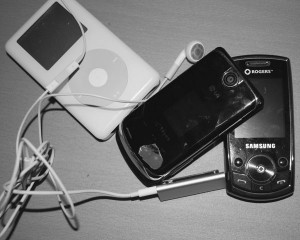Does constant communication help or hinder?
January 11, 2010 by Kristi Jut
 The number of people who have cellphones may have skyrocketed in recent years, but communications instructor Pamela Ip says the basics of communication haven’t really changed.
The number of people who have cellphones may have skyrocketed in recent years, but communications instructor Pamela Ip says the basics of communication haven’t really changed.
Nearly 75 per cent of Canadians owned a cellphone in late 2008, according to Statistics Canada. Just two years earlier, only about 67 per cent of us had one.
In the same report, Stats Can also said households of younger people (18-34) were more likely to own cellphones and, in many cases, to use cellphones only. A slew of cellphone-use statistics put out by a UK online news site, Telegraph, claimed that the average age at which a person begins to use a cellphone is eight-years-old.
Ip said she recognizes the advantages of heightened communication due to the invention of the cellphone, but added that it’s not all positive.
“Technology, with each [new] device, increases communication, but it also creates an unnecessary dependence on it,†Ip said. “We’re so dependent on these things that if people leave their cellphones at home or their e-mail is down for a couple hours, we start to get extremely anxious about that.â€
And anxious we have been conditioned to be, as we now rely on getting our information faster and more efficiently, with the advent of blogging and tweeting. We are being updated on news as it is reported instantaneously, through news sites and blogs, and have learned to communicate in the same way. We send a text-message and expect a response in a minute or less.
But instantaneous communication isn’t necessarily making us more efficient, and, according to Ip, is actually making us more “flaky.â€
“It also makes us think very lastminute; like instead of saying we’ll meet at the restaurant at a certain time, we say ‘I’ll call you when I get to the restaurant,’†said Ip.
Talking on a cellphone while driving has become such a problem that it has been banned in Newfoundland, Ontario, and Quebec, with fines of up to $500.
The B.C. government is also looking to pass a bill to ban cellphone use while driving. B.C. Solicitor General Kash Heed introduced the bill in October. If passed, the new law would take effect Jan.1, although the $167 fine to violaters wouldn’t be implemented until Feb. 1.
The way we communicate and collect information can also leave us with a shorter attention span. A BBC News article titled “Turning into digital goldfish†claimed that “web-browsing can leave you with an attention span of nine seconds— the same as a goldfish.†The article, which relied on the help of Ted Selker from the Massachusetts Institute of Technology, said that our bodies become conditioned to “flitting from one thing to another on the web [so that] we get into the habit of not concentrating.â€
Ip argues that communication itself hasn’t actually changed, but the face of it has.
“Whether you’re talking to a professor or to a peer, you still need to know the fundamentals no matter what the media,†she said.



Comments
Feel free to leave a comment...
For details on how we handle comments, select "Our Comment Policy" from the "About" drop-down menu at the top of the page.
Note: All comments are moderated and must be approved before they are published.